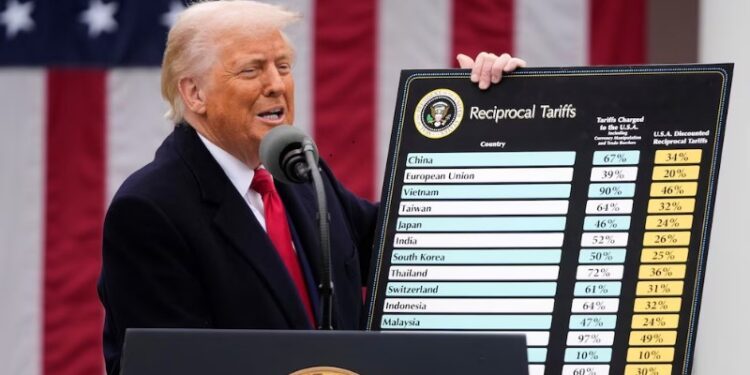The recent tariffs imposed by US President Donald Trump have sent shockwaves across the globe, with Nigeria being one of the countries affected. The new policy introduces a 10% baseline tariff on all US imports, along with country-specific reciprocal tariffs targeting nations with high duties on American goods.
Nigeria, in particular, will face a 14% tariff on its exports to the US, reflecting the 27% duty the US claims Nigeria imposes on its goods. This move could have significant implications for Nigeria’s economy, especially considering the country’s trade with the US totaled N31.1 trillion ($38 billion) between 2015 and 2024.
The tariffs could make non-oil exports from Nigeria less competitive in the US market. Nigeria’s oil-dominated exports to the US have declined in recent years, and this new tariff could exacerbate the situation. Furthermore, the tariffs threaten key trade preferences under the African Growth and Opportunity Act (AGOA), which has given African nations preferential access to the US market.
To mitigate the effects of these tariffs, Nigeria may need to consider renegotiating tariff structures or exploring alternative markets. Developing nations like Nigeria face a stark choice: lower their tariffs on US goods or accept tougher trade barriers in the world’s largest consumer market.
Nigeria, like many other countries, will need to carefully consider its response to these tariffs. Here are some options to explore:
– Diversification of Trade Partnerships: Nigeria can strengthen trade ties with other countries, reducing dependence on the US market.
– Negotiation and Diplomacy: Engaging in diplomatic efforts with the US can help address concerns and potentially lead to more favorable trade terms.
– Tariff Retaliation: Imposing reciprocal tariffs on US goods could be an option, but this may escalate tensions and harm Nigerian businesses.
– Domestic Economic Development: Focusing on internal economic growth, infrastructure development, and industrialization can reduce Nigeria’s reliance on international trade.
To strengthen trade with the US, Nigeria can:
– Improve Trade Infrastructure: Enhancing ports, transportation networks, and logistics can increase efficiency and reduce costs.
– Promote Export-Oriented Industries: Encouraging industries that produce export-oriented goods can help Nigeria tap into the US market.
– Foster Business-to-Business Relationships: Encouraging partnerships between Nigerian and American businesses can help build trust and increase trade.
In conclusion, Nigeria must carefully navigate the implications of Trump’s tariffs and explore opportunities to strengthen trade with the US. By diversifying trade partnerships, negotiating with the US, and focusing on domestic economic development, Nigeria can mitigate the negative impacts and promote economic growth.
ABOUT DIPLOMATICINFO.COM
DIPLOMATICINFO.COM, is a leading international online platform that provides insightful analysis, news, and commentary on diplomacy, international relations, and global affairs. Our mission is to promote informed discussion, foster greater understanding, and facilitate constructive engagement among stakeholders. By highlighting the challenges and opportunities facing Nigeria, we aim to contribute to the national conversation and inspire meaningful change.
Editor-in-Chief/CEO: Dr. Elvis Enyioko
+2348077753824
contact@diplomaticinfo.com






